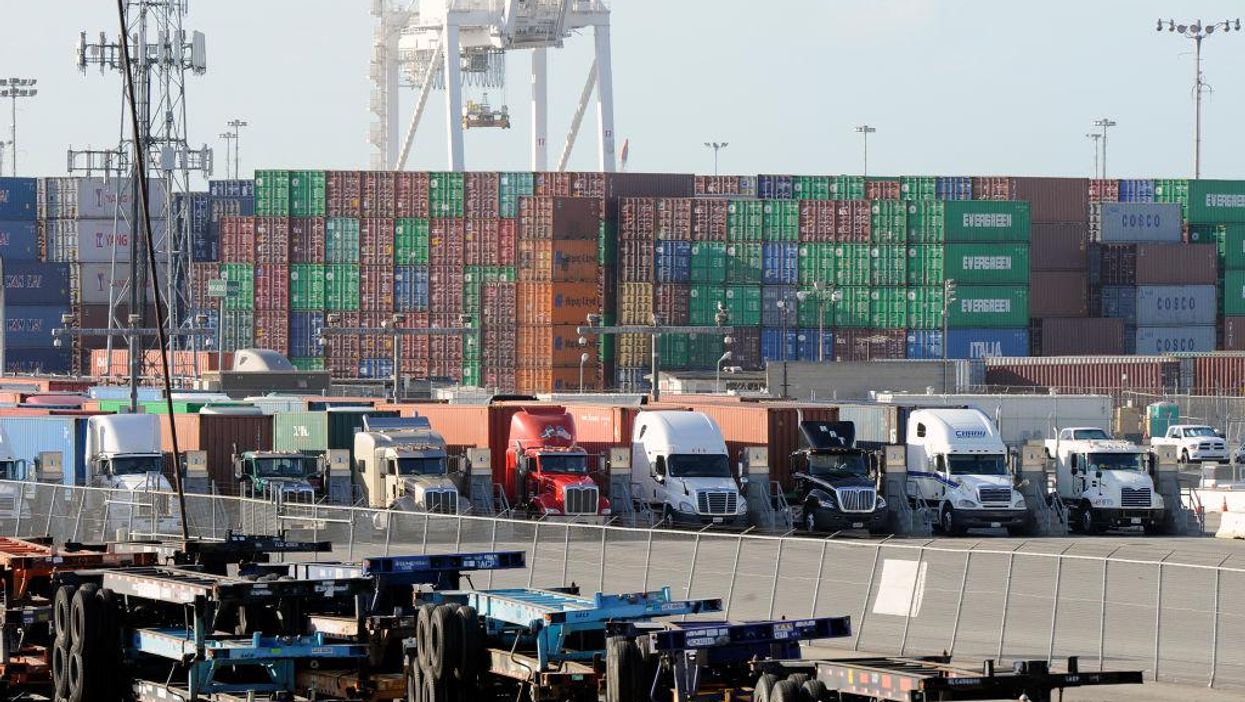
Bob Riha, Jr./Getty Images

A California law threatens to unleash more supply chain misery and inflation on residents of the Golden State by forcing independent truckers out of the workforce.
California Assembly Bill 5 was introduced by former state Assemblywoman Lorena Gonzalez, a Democrat, and signed into law in September 2019 by California Gov. Gavin Newsom.
AB5 called for "a person providing labor or services for remuneration shall be considered an employee rather than an independent contractor unless the hiring entity demonstrates that the person is free from the control and direction of the hiring entity in connection with the performance of the work, the person performs work that is outside the usual course of the hiring entity’s business, and the person is customarily engaged in an independently established trade, occupation, or business."
Certain professions were exempt from AB5, including insurance agents, health care professionals, investment advisers, realtors, barbers, and fishermen. However, truckers were not exempt from AB5.
AB5 targeted independent contractors who were app-based delivery and rideshare drivers. Ironically, companies like Uber, Lyft, and Postmates were exempted from AB5 after Proposition 22 was passed in November 2020.
The trucking industry has been fighting the law ever since it went into effect, and secured an injunction that prevented AB5 from including independent truckers in January 2020.
California Attorney General Xavier Becerra called on U.S. District Judge Roger T. Benitez to reverse the injunction.
"The district court also abused its discretion in assessing the remaining preliminary injunction factors, erroneously concluding that Plaintiffs established irreparable harm despite the fact that they waited over 19 months to seek injunctive relief, and giving short-shrift to the State’s interest in addressing misclassification of state employees," Becerra stated in March 2020. "This Court should reverse."
On June 28, the U.S. Supreme Court declined to review the case of the California truckers battling against AB5.
"This ruling really took everybody off-guard, especially at the speed that they kicked this back and essentially made it law," Paul Brashier – vice president of a commercial transport company – told CBS News.
Now, the truckers must be employees of trucking companies and not independent contractors in order to be able to work in California.
However, there seems to be confusion on how the law will be enforced.
Norita Taylor, director of public relations for the Owner-Operator Independent Drivers Association, informed Bloomberg, "We have never gotten any good answers from anyone official in California on how this is supposed to be enforced or how our members can comply."
If the law is enforced, California faces a possible mass exodus of the state's estimated 70,000 independent truckers.
The Port of Oakland is especially vulnerable if independent truckers are forced out of work.
"There's 9,000 trucks that serve the port on a daily basis, and 90% of them are independent contractors. So, this is a big, big impact," said Bill Aboudi owner of AB Trucking in Oakland.
Aboudi explained that his independent contractors own their own trucks.
"It just doesn't work. You own your own truck, it's your truck. I can't take possession of it and start using it," he added. "In a case like my company, we just eliminate owner/operators and just reduce the workload."
Kevin McMaster – vice president of carrier sales at Flock Freight – noted, "This would cause a ripple effect in the industry, pushing many drivers who don’t want to apply for their own authority to lease out of state, likely in Arizona or Nevada, and even force some into retirement due to increased market pressures. There will likely be pressure added on capacity in California that could exacerbate an already tough environment where drivers are at a premium."
Brashier believes many independent truckers will leave California for states where they can work as contractors. The departure of the truck-owner operators would likely negatively impact Californians.
"It's going to adversely affect everybody," he told KPIX-TV. "And at the end of the day, with where we are with inflation being as high as it is, this is going to put inflationary pressure on the consumer, right?"
The California Trucking Association delivered a warning, "Gasoline has been poured on the fire that is our ongoing supply chain crisis. In addition to the direct impact on California’s 70,000 owner-operators who have seven days to cease long-standing independent businesses, the impact of taking tens of thousands of truck drivers off the road will have devastating repercussions on an already fragile supply chain, increasing costs and worsening runaway inflation."
Lorena Gonzalez – who authored AB5 and resigned from the state assembly in January – had no sympathy for the truckers.
"They’ve known for the last two and a half years that it was equally possible that this injunction would not hold," Gonzalez said. "This is not a shock.”
"The fact that trucking companies will have to abide by basic labor laws in CA takes us one step closer to rebuilding the middle class that was almost deregulated out of existence," tweeted Gonzalez – who now heads the California Labor Federation.
On Wednesday, California Republican lawmakers implored Democratic Gov. Newsom to either delay the implementation of the law or exempt truckers from AB5.
\u201cNEW: California Republican lawmakers request @GavinNewsom use his executive powers to delay AB5 (worker classification law) or exempt truckers from it altogether. \n\nThe group warns the workforce will take a hit, disrupting the supply chain, and drive inflation.\u201d— Ashley Zavala (@Ashley Zavala) 1657140630